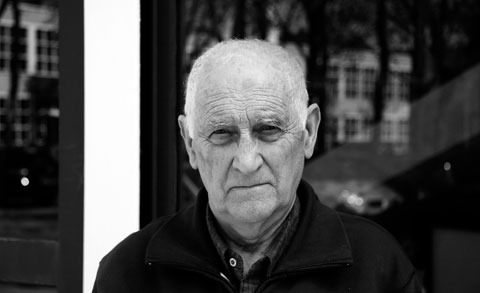“Imagine you are in a pitch-dark room, facing a table with a deck of playing cards spread out on it. They are distributed randomly across the table and the only thing you know is that five cards face down, the rest face up.
You are allowed to turn the cards, but you cannot see a single thing. How can you divide the cards into two separate stacks, each having the same amount of face down cards?”
This is how the conversation with 83-year-old graduated from TU Delft’s Applied Physics department sixty years ago. Van der Poel is famous for his work during the 1950s on the first generation of computers in the Netherlands: the Testudo and the Zebra. Besides computers, Van der Poel has a passion for puzzles, both mechanical and vocal.
When did your interest for computers start?
“I started working on computers as a teenager. I was very bad at mental calculations, so I was always looking for means to do the calculations for me. As it was during the Second World War, there was plenty of time to develop my interest. I turned the whole library upside down in my search for literature on computers. In 1944 I made my first draft for the design of a computer.”
How did you end up in Delft?
“After the war, professor N.G. de Bruyn offered me a job as a research assistant at the Technische Hogeschool Delft [the former name of TU Delft – ed.] to develop my ideas. In 1947 I started building the Testudo, which is Latin for tortoise. The computer was named after a tortoise for a reason; it took the machine two hours to calculate what a human could do in one hour. However, humans make errors, Testudo did not. Besides, that the computer needed no food, no drinks and it was never tired.”
Was Testudo the first computer in the Netherlands?
“At that time there were two competing parties, Technische Hogeschool Delft and the Mathematical Centre of Amsterdam. The Arra [Automatische Relais Rekenmachine Amsterdam, or Automatic Relay Calculator Amsterdam – ed.] was finished a few months before the Testudo, but it never functioned properly. Testudo on the other hand was in service for 12 years. The Arra was built for speed, while Testudo was designed for reliability.”
Was the large potential of computers known to the researchers in those days?
“In the 1950s and 1960s most managers asked for single purpose machines with specific tasks. Researchers realized that if you build general purpose computers, the same machine could be used for various applications. But even the people involved in building computers at that time did not foresee the range of possibilities computers have today. At Cambridge University I worked with leading scientist, named Hartry, on the Adsec, one of the first general purpose computers in the UK. He believed that four of those machines would provide enough computational power for the whole of the UK for almost a decade. He did not realize computers had a far bigger potential.”
Are you still involved in computers at this moment?
“I am an advisory member of Scen (Stichting Computer Erfgoed Nederland), an institution for computer heritage in the Netherlands. We’ve categorized and collected historical computers all throughout the country. Unfortunately there is not a single museum in the Netherlands that is interested in displaying our collection.”
After one hour of talking about computers, Van der Poel becomes distracted.
“So, shall I show you some mechanical puzzles now?” He opens his suitcase and takes out a dozen wooden puzzles. Each puzzle consists of different blocks and can only be solved by shifting the blocks in a particular order. Some of the puzzles cannot be moved at all. “Don’t use force,” he says, as we try to solve the puzzles.
When did your passion for mechanical puzzles begin?
“I got my first puzzle when I was seven years old, and have been addicted ever since. At home I have over 3,000 puzzles. There is even an international group of puzzle fanatics that meets once a year. In order to be part of the group you have to design your own puzzle and exchange 100 copies with the other members. As a result, at the end of the conference you go home with a hundred new puzzles!”
Can your passion for mechanical puzzles be linked to your interest in computers?
“Most computer problems can be viewed as puzzles. It requires a certain way of thinking to be able to solve them. Computers also offer all kinds of possibilities to enhance puzzles. Puzzles that I designed in my head in the 1950 can now be updated and made more interesting with the help of computer software.”
Dally is werkzaam bij het centrum voor energietechnologie van de universiteit van Adelaide. Hij bezoekt een aantal Europese universiteiten in het kader van het VRP (visiting researcher programme). Na Stuttgart, Darmstadt en Aken staat maandag Delft op het reisschema.
De eerste deel van de lezing van Dally gaat over energietransitie (On the Transition to Sustainable Energy Generation) en de rol van het centrum voor energietechnologie daarin.
Het tweede deel gaat over onderzoek naar Moderate or Intense Low oxygen Dilution (MILD) combustion, ook wel vlamloze verbranding genoemd.
Maandag 7 september, 11 uur, Lorentzweg 1 (Technische Natuurkunde) zaal F, gevolgd door lunch in Kronig-zaal



Comments are closed.